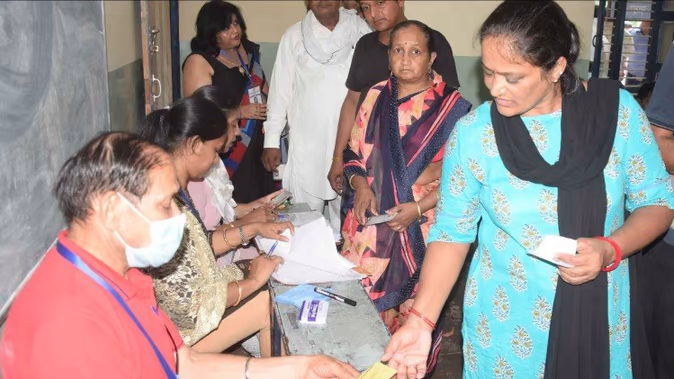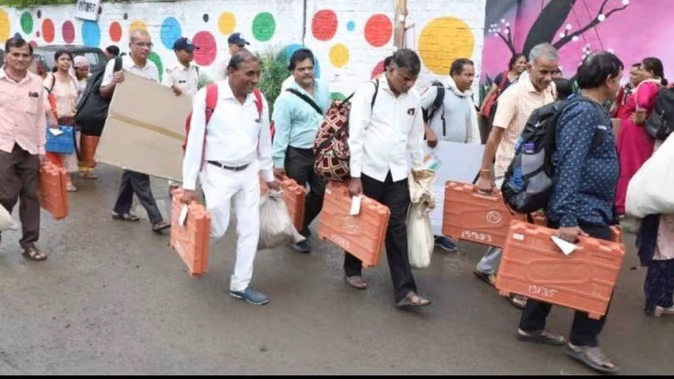Compulsory Voting Bill 2022: What is Compulsory Voting Bill-2022? What kind of punishment is proposed for not voting in it? How many times has such a bill been introduced before? Let's know…
Deepak Prakash - Photo : twitter
President Draupadi Murmu has recommended the consideration
of the Compulsory Voting Bill-2022 under Article 117 of the Constitution. BJP
MP Deepak Prakash introduced this bill as a private member's bill on 22 July.
Because of the financial implications of this private bill, the President's
constitutional approval was required before the House could consider and pass
it. Which deals with special provisions with respect to financial bills under
Article 117 of the Constitution. Now this bill can be discussed in the coming
winter session.
Polling parties had reached the polling station with election material - Photo : Social Media
What is Compulsory Voting Bill-2022? What kind of punishment
is proposed for not voting in it? Is there any incentive proposed for those who
vote continuously? How many times has a bill like this been introduced before?
What happened to the first bill? Who brought such a bill for the first time?
What is
Compulsory Voting Bill-2022?
Jharkhand BJP President and Rajya Sabha MP Deepak Prakash introduced this private bill on 22 July 2022. Prakash says that after many efforts, not more than 60 percent voting takes place in the country. There are many countries around the world like Australia, Mexico, and Greece where it is mandatory for voters to vote. In this bill of Prakash, there is a proposal of punishment for not voting and incentive for continuously voting.
 |
| Voting - Photo : The Brief India |
Has such a
bill been introduced before?
Earlier on July 12, 2019, BJP MP Janardan Singh Sigriwal
also introduced the Compulsory Voting Bill-2019 Bill. However, he later
withdrew this private bill. Sigriwal withdrew this when the central government
said it was not practical to implement such provisions. The then Minister of
State for Law had called it against the spirit of democracy. Even before this,
16 such private bills have been introduced in Lok Sabha or Rajya Sabha. All
were either withdrawn or could not pass. This bill of Deepak Prakash is the
17th such bill.
When and by
whom was the first such bill introduced?
The first such bill came in 1998. It was introduced by the
then Congress MP T. Subbarami Reddy.
What was in the Compulsory Voting Bill first
introduced in 1998?
In 1998, for the first time, an MP introduced a private bill
for compulsory voting in the House. The bill was brought by Congress MP T.
Subbarami Reddy. At that time voting was done by ballot paper instead of EVM.
The bill proposed that the Election Commission would arrange for mobile ballot
vans in every constituency. In this, people who are not in a position to cast
their votes by going to the polling booth will have the facility to cast their
votes.
In this bill also, there was a proposal for punishment for
not voting and incentive for casting. In that resolution, a fine of one hundred
rupees or a day's jail was proposed for those who did not vote. If the vote was
not cast intentionally, then such a voter was offered both the punishments.
Along with this, there was a proposal in this bill to confiscate the ration
card, disqualify from contesting elections for six years. If the voter is a
government employee, then along with these punishments, there was a proposal to
deduct four days' salary and not to give promotion for one year.
How many
different proposals are there in the bill introduced this time from the first
bill?
Like the bill introduced in 1998, this time also there are proposals for similar punishments for not voting. Only their duration and quantity have been increased. For example, in the 1998 bill, a fine of Rs 100 was proposed, then in this bill a fine of Rs 500 is proposed. In the 1998 bill, there was talk of jail for one day, then in this bill there is talk of jail for two days. Similarly, there is a matter of punishment for deducting salary of ten days instead of four for government employees and not promoting for two years instead of one. In 1998, where there was talk of disqualification from contesting elections for six years. This time the bill talks about disqualification from contesting elections for 10 years.
 |
| Voters taking ballot papers to vote. - Photo : The Brief India |
Is there
any incentive to be given to those who vote continuously?
According to this bill introduced by Deepak Prakash, if a
voter votes even after illness or physical disability. If a voter casts vote in
all elections for 15 consecutive years, such voter should be given preference
in government jobs and higher education.

